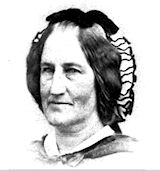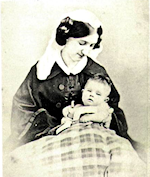Lenox, Sept. 12, 1861.
To-day has been very beautiful. Such floating clouds and corresponding shadows, such liquid blue on the distant hills and such gold green on the nearer meadows! We saw it to advantage at sunset, from Mrs. Sedgwick’s house. Only Miss Catherine was at home, and we saw her in her own little parlor, hung with photographs and engravings and one or two old choice portraits. But the picture from the window was best of all. . . . We had a charming drive one day with the Warners (of the “Wide, Wide World”) to Tyringham, the Shaker settlement below Lee, which name reminds me of the story we heard of the loyalty of that little village. It had already sent its full proportion to the army. But that dreadful night when the news of disaster at Bull Run came, the baker told the Warners “Nobody couldn’t eat nothin’ and nobody couldn’t sleep none.” That very midnight sixty men of Lee started in the cars for New York and enlisted for the war. … I had a chance of seeing Mrs. Kemble to-day as she drove by, silks and lace and birds of paradise, several I should think by the size. She is the great woman of the place here. Her daughter, Mrs. Wistar, was with her—strikingly like her, and yet young, fair, simple and beautiful. She came back yesterday from New York with Julia Butler the sister. They had been down to see their father in Fort Lafayette.
![]()
. . . . . .
In consequence of complaints made of the treatment of the political prisoners, Dr. Bellows, the President of the Sanitary Commission, inspected Fort Lafayette and reported to the Secretary of State Oct. 31, 1861 —” Every man has his own cot, plenty of blankets and abundance of food. They were in better condition in all respects than our own men in the field. They have many acres for play-ground. They complained of nothing though I gave them abundant opportunity.”. . . . . .
![]()
Sarah C. Woolsey, writing from Lenox, says;
. . . I was highly diverted by a story Mrs. Kane told Jenny Yardley of Mrs. Kemble. She was playing whist the other night with Mrs. Ellery Sedgwick as a partner, and became really furious because Mrs. Sedgwick played so badly. Finally, just as her rage had reached its height, Mrs. Sedgwick remarked, “I do not know what is the matter with me! somehow I can’t play well, or talk straight, or do anything right this evening, and it is strange, for I certainly do know how to play whist.” Whereupon the majestic Fanny exploded: “Well, I am glad to hear that. It is a comfort to know that one has for a partner an inattentive genius and not a born fool!”
Mrs. Kemble was most friendly with the various members of the family, though unexpected at times, as for instance when she remarked to Harry Yardley, while Lilly Woolsey was his guest, “Mr. Yardley, you have a very handsome young woman at your house; I do not refer to Mrs. Yardley.” However, the people in Lenox seemed used to these little bursts. They never resented them and only made a good story of it all, which they enjoyed.






